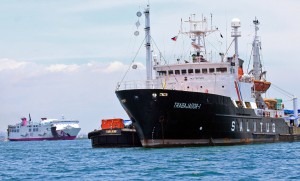
The MV Pope John Paul II of 2go Shipping (left) pass by before the Siphoning vessel of Malayan Towage while their technical divers started to putting on pipes on the sank ill-fated St. Thomas Aquinas siphoning operation of the remaining oil in the vessel at Lawis Ledge. JUNJIE MENDOZA /CDN
CEBU CITY—The Board of Marine Inquiry (BMI) has found the collision last year between a passenger and cargo vessel that killed 116 people last year to be caused mainly by human error.
In a report on its findings, BMI said the captains of the two vessels involved in the collision—MV St. Thomas Aquinas and MV Sulpicio Express Siete—had both committed errors that led to the collision at sea in Talisay City on Aug. 16 last year.
The BMI report, however, was careful to pin blame on either 2Go Group Inc., which owns Thomas Aquinas, or Philippines Span Asia Carrier Corp. (PSACC, formerly Sulpicio Lines), which owns Express Siete.
2Go appealed the BMI finding, seeking to blame PSACC for the tragedy.
In its report, the BMI said Thomas Aquinas should have given way to Express Siete.
Express Siete was heading for Davao City from the Cebu port while Thomas Aquinas was bound for docking at the Cebu pier.
BMI said international shipping rules require vessels entering ports to give way to vessels coming out of the port.
It said Express Siete should have maintained its course and speed and kept watch on Thomas Aquinas.
When it became apparent that Thomas Aquinas was not giving way, Express Siete should have taken action to avoid the collision, said the report.
The ships’ captains, Reynan Bermejo (Thomas Aquinas) and Rolito Gilo (Express Siete), didn’t do what they were supposed to to avoid the collision.
The BMI report said Thomas Aquinas was moving at an unsafe speed—16 knots. Its captain, Bermejo, did not reduce the ship’s speed even after seeing Express Siete approaching.
“Captain Bermejo should also always have in his mind the safety of all the people on board the passenger vessel he is commanding,” the BMI said report said.
The BMI report also noted that Express Siete was using a VHF (very high frequency) radio, which is not the proper communication tool for sea vessels. The VHF channel it used, the report said, was restricted.
Both vessels also “forgot to make use of light and sound signals to effectively communicate,” the report said.
The BMI report said the captains of both vessels also failed to properly and effectively monitor and study the movements of each other’s vessels visually.
The Express Siete, according to the report, also had poor data recording, which the BMI report said was not in accordance with rules on safety management systems.